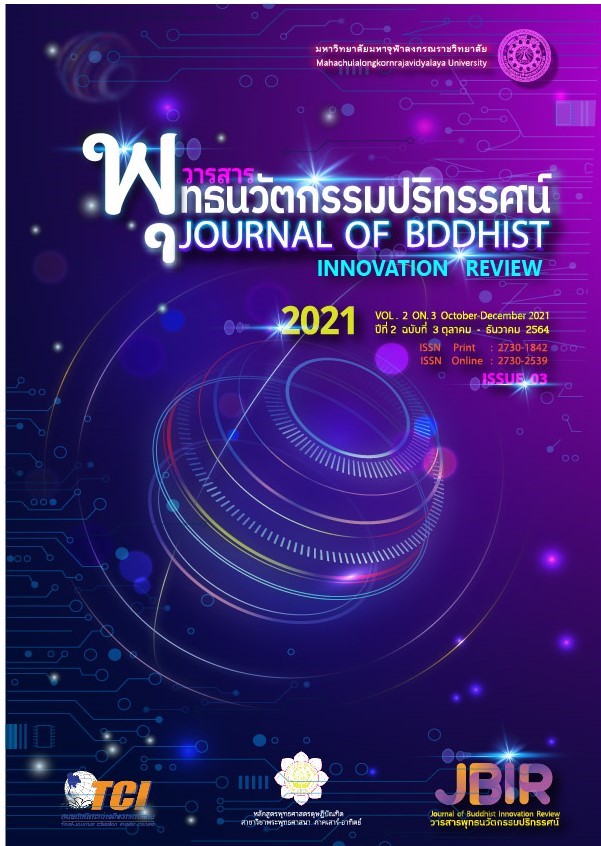Mindfulness as a guardian of the City to be safe and free from illness (arrogaya)
Main Article Content
Abstract
Abstract
The academic article entitled ‘Mindfulness as a guardian of the City to be safe and free from illness (arrogaya)’ presents the roles of mindfulness that serves as a protector of the City. The article reflects the two literatures namely: ‘Guynakorn’ compiled by Mr. Plack Sonthirak and ‘Jittanakorn’, capital of the world. They are compositions of His Holiness the Supreme Patriarch of Thailand, Somdet Phra Nyanasamvara Somdet Phar Sangharaja Sakalamahasanghaparinayaka which describe the body and mind (five aggregates) in personification. Body and mind are the land of the scramble for possession both the good and the bad. It can be happiness or suffering or non-happiness and suffering under ‘the three marks of existence’. Both body and mind can be developed to find freedom and be safe from dangers in transmigration by applying mindfulness that serves as a first stage of screening, preventing the six gates and gestures without negligence. Mindfulness is the most important dharma compared with the elephant footprint which is the largest among all animal footprints, as appeared in ‘Guynakorn’ and ‘Jittanakorn’. At present, humans suffer from the covid-19 pandemic. They should rely on mindfulness 5 P’s (Powers) in order to live safely without illness (arrogaya) and happily forever.
Article Details

This work is licensed under a Creative Commons Attribution-NonCommercial-NoDerivatives 4.0 International License.
เรื่องลิขสิทธิ์/เป็นความคิดเห็นของผู้เขียน
References
เอกสารอ้างอิง
หนังสือ
พระธรรมปิฎก. (ป.อ. ปยุตฺโต), (2543). พจนานุกรมพุทธศาสตร์ฉบับประมวลธรรม. กรุงเทพมหานคร: โรงพิมพ์มหาจุฬาลงกรณราชวิทยาลัย.
มหาจุฬาลงกรณราชวิทยาลัย. (2539). พระไตรปิฎกภาษาไทย ฉบับมหาจุฬาลงกรณราชวิทยาลัย. กรุงเทพมหานคร: โรงพิมพ์มหาจุฬาลงกรณราชวิทยาลัย.
มหามกุฏราชวิทยาลัย. (2538). พระไตรปิฎกภาษาบาลี ฉบับสยามรัฐ. กรุงเทพมหานคร: โรงพิมพ์มหามกุฏราชวิทยาลัย.
ราชบัณฑิตยสถาน. (2546). พจนานุกรมฉบับราชบัณฑิตยสถาน พ.ศ. 2542. กรุงเทพมหานคร: นานมีบุ๊คส์พับลิเคชั่นส์.
สื่ออิเล็กทรอนิกส์
ทองย้อย แสงสินชัย. สติมา-คำไทยก็ดี คำบาลีก็ดี. [ออนไลน์]. เข้าถึงได้จากhttp://dhamma.serichon.us /2019/08/31. (วันที่สืบค้น 13 กันยายน 2564)
ปัณณทัต กาญจนะวสิต. โลกยุค 4.0. [ออนไลน์]. เข้าถึงได้จากhttp://www.dsdw HYPERLINK "http://www.dsdw2016.dsdw.go.th (วันที่สืบค้น 14 ตุลาคม 2564)
แปลก สนธิรักษ์. กายนคร. [ออนไลน์]. เข้าถึงได้จาก storydhamma.blogspot.com. (วันที่สืบค้น 1 กันยายน 2564)
วิกิพีเดีย สารานุกรมเสรี. สติ.[ออนไลน์].เข้าถึงได้จาก https://th.wikipedia.org/wiki/. (วันที่สืบค้น 13 กันยายน 2564)
สมเด็จพระญาณสังวร. จิตตนคร:นครหลวงของโลก. [ออนไลน์]. เข้าถึงได้จาก https://wbu.world/wp- content/uploads/201. (วันที่สืบค้น 1 กันยายน 2564)
Thai-English:NECTEC's Lexitron HYPERLINK "https://lexitron.nectec.or.th/"- HYPERLINK "https://lexitron.nectec.or.th/"2 Dictionaryconscious. [ออนไลน์]. เข้าถึงได้ จาก https://dict.longdo.com/search/conscious. (วันที่สืบค้น 1 กันยายน 2564)


